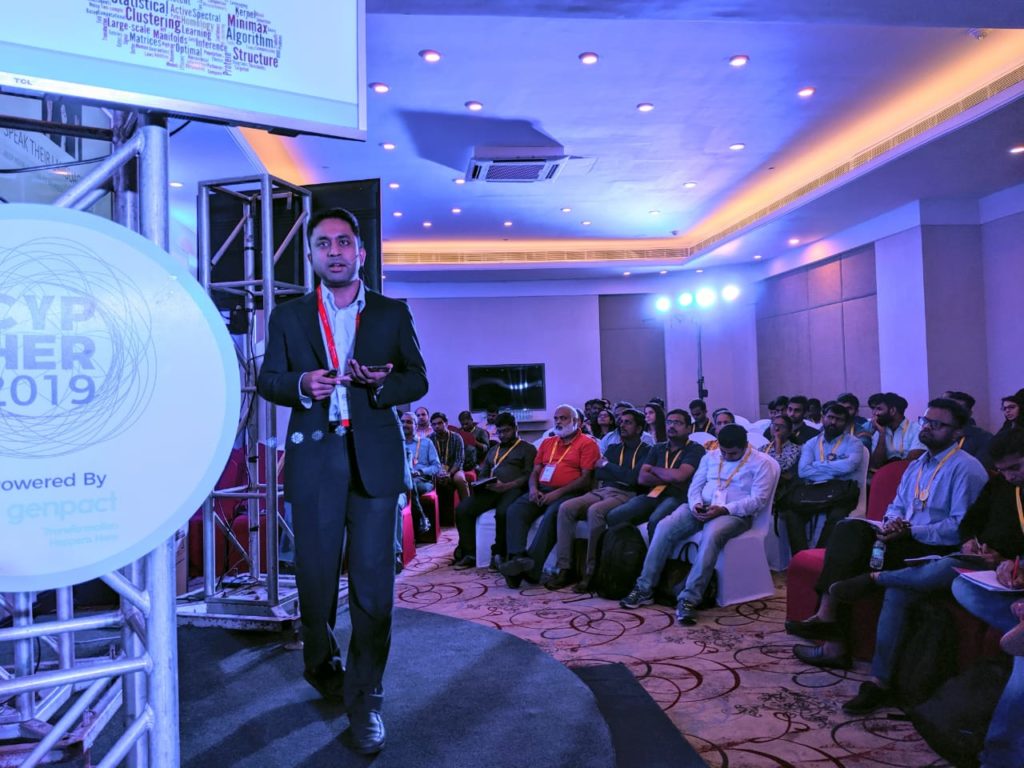Analytics India Magazine connected with Dhruv Rastogi, Vice President for Big Data and Advanced Analytics at Vodafone Idea, during his talk at Cypher, India’s largest AI and analytics summit. Rastogi shared great insights on how companies can empower all individuals by using artificial intelligence and machine learning-powered tools. He also talked about the challenges that lie ahead in getting to the level where AI is finally going to be democratised.
Rastogi leads Vodafone Idea’s data science strategy, which has been focused on customer experience with all products and services the telecom company sells whether to enterprise clients or to end consumers. All of that comes through putting in things like machine learning and artificial intelligence, analysing lots of data, and making sure the network itself has the intelligence to act on its own or with human assistance. Vodafone Idea has been building this intelligence end-to-end, leading with the power of data analytics from millions of subscribers and enterprise clients.
“We at Vodafone Idea have a vast subscriber base, and we are continually working on how to reduce churn, how to upset products to subscribers, how to cross-sell, how to recommend the right products, how to improve our supply chain dynamics and how to bring in more efficiency. The opportunities are tremendous in telecom domain especially because of the amount of data we have that can be tapped to uncover insights about subscribers, and once you understand that, we are able to serve our subscribers better. Data science and machine learning technologies will help us to understand subscribers at an individual, micro-segment level and by looking at hundreds of features about will give us a more holistic view. That’s what scalable solutions like machine learning and data science help you do,” explained Rastogi.
Democratising AI/ML For Vodafone Idea
Experts have been saying that everyone in the organisation should be able to take advantage of the AI/ML solutions which are being developed by a specific group of individuals or a particular team within the organisation. What it means is that the intelligence coming from those solutions should not be restricted to a few boxes or a few individuals. For instance, in a large retail organisation, starting from people who work in the stores, the marketing team, the finance teams, the people who are sourcing raw materials for you, the people who are at the various corporate offices should all be empowered to take decisions which are much smarter and automated. This will help in improving the day to day work efficiency. This is precisely what Rastogi reiterates vociferously.
“A lot of tools and techniques are already there. What I see going ahead in 1 year is more and more non-data scientists started using data science tools. Data science will not be restricted to a few individuals, to a few boxes, to a few machines. I am sure through different means, more individuals in the organisation will be empowered in some way or the other to make more meaningful and data-driven decisions,” told Dhruv Rastogi from Vodafone Idea.
Challenges In Empowering Teams With AI/ML
It is well known in the analytics community that many a time it is not about getting the right ML algorithm; instead, it’s about getting the right data. Most of the models fail because the data itself was incorrect, especially the real-life data sets. Open-source data sets are well cleaned and have done the sanity checks, but organisations many always have data sets which have problems in them. Especially understating specific business KPIs in databases in legacy systems can be challenging.
A lot of traditional companies have data, and there are data science teams, then why is it that it’s not getting operationalised at a highly scalable level, especially today when there are multiple cloud vendors and various solutions which are open source? When we asked this question, Rastogi points to a few challenges that are not being overcome. He said there is an apparent gap between what is available in the data science research labs to what is getting implemented.
“One challenge there is multiple tech stacks. If we look at any mid to large size organisations, which may be 2-3 decades old, not the one started in the last five years, those ones have a lot of legacy tech systems. Where departments whether finance, sales or marketing, manufacturing are using different systems. How do you build a system which is scalable across these different systems? There are many legacy systems which are not able to consume the solutions which you develop as a part of your data science stack. Change management is another one where people perceive these solutions. If somebody is working in a particular way in the last ten years and you come up with a better solution may not go well with the people who execute it on the ground. Another is the stakeholders where different people may have different analytical maturity.”
Rastogi further said that it’s difficult for the stakeholders or clients to use a solution which is disparate or disconnected with their existing workflow. It should be integrated with their workflow and another tab or another intelligence layer which is built in their existing workflow, rather than them going and launching another application.
Overcoming The AI/ML Challenges
Here is what Dhruv Rastogi says can overcome the challenges in democratising AI/ML for the organisation. First is the deep understanding of the data itself of the specific domain you are working with, and understand what needs to be modelled. The second is bringing about effective change management, especially for mid to large size organisations which are unto 3-4 decades old, to help them change the way they are working right now. Slow and gradual but consistent efforts have to be made for people to start adopting and empowering themselves using AI and ML.
Rastogi further said data scientists have to get rid of jargon and technicalities while communicating with business departments. He says there is a need to speak the language of the business KPIs. “While analytics professionals and data scientists are very happy talking about deep learning, machine learning, CNNs/RNNs, and so on, the marketing or sales teams don’t care about all that jargon. What they care about is how can the solutions help in increasing sales, increasing margins, reducing frauds, and managing cash flows better. The outcome has to be business KPIs and so whenever we explain a solution, one easy way to get the attention is how a particular solution is going to help the business KPIs,” he explained.

























